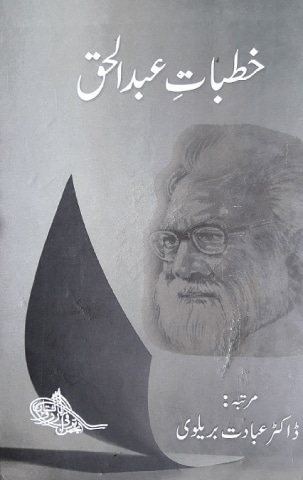
MOULVI Abdul Haq, often reverently called Baba-i-Urdu, or Father of Urdu, died on Aug 16, 1961 — exactly 60 years ago.
Having been made the secretary of Anjuman Taraqqi-i-Urdu (ATU) in 1912, Abdul Haq began his mission to promote Urdu and carried it on for about half a century.
ATU was an offshoot of Muhammadan Educational Conference (MEC), which was formed in 1886 by Sir Syed Ahmed Khan to promote modern education among Muslims of the subcontinent. In its 1906 meeting held at Dhaka in the wake of Indian National Congress’s support for protest against Partition of Bengal (1905), MEC decided to form All India Muslim League (AIML), the party that ultimately fought for Pakistan and won it. So, both AIML and ATU were born out of MEC.
Urdu had been tagged as “the language of the Muslims” by Hindu revivalists, though those who knew or spoke Urdu had never made such a ridiculous claim. According to Dr Farman Fatehpuri, the Hindi-Urdu controversy began to surface after 1857 and in the 1860s some Hindu leaders and organisations, such as Banaras Institute and Allahabad Institute, had demanded that Urdu be replaced with Hindi as the official language, since Hindi was the language of the majority. This rigid stance forced even a moderate and pacifist Muslim like Sir Syed Ahmed Khan to spell out his famous ‘Two-Nation Theory’. The Hindi-Urdu controversy in a way gave birth to Muslim nationalism in India and resulted in the formation of MEC and AIML, which in turn paved the way for Pakistan. Hence, Urdu played a vital role in the creation of Pakistan (Hindi Urdu Tanaz’u, NBF, 1977, page105-153).
MEC had initially constituted three committees for the promotion of education and ‘Sh’oba-i-Taraqqi-i-Urdu’ (Department for promotion of Urdu) was its ancillary body. But it was felt that there must be a separate organisation, or ‘anjuman’ (literally: congregation or society), to promote the Urdu language and in 1903 ‘Sh’oba-i-Taraqqi-i-Urdu’ was reamed as Anjuman Taraqqi-i-Urdu. Shibli No’mani was made its secretary and the offices were based in Aligarh.
When Abdul Haq took over as secretary in 1912, ATU did not have much to take credit for. Abdul Haq moved ATU’s offices to Aurangabad (Deccan) in 1913 under the patronage of the ruler of the state of Deccan. In 1938, the word ‘Hind’ was added to its name and ATU was shifted to Delhi to play a more effective role for the promotion of Urdu and to participate in Pakistan movement as political front was afire with emotions. On the issue of language, Mahatma Gandhi and Moulvi Abdul Haq were at loggerheads, with Gandhi advocating ‘Hindustani’ as a common language for India and Abdul Haq asking that what ‘Hindustani’ really meant, sensing the motives of Hindi’s imperialism.
Abdul Haq had said that there was no such thing as ‘Hindustani’. In his presidential address to Indian Oriental Conference, Baroda (December 1933), Abdul Haq had said: “There is a lot of clamour of voices in social speeches and political writings referring to Hindustani. What is Hindustani and where is it? Who writes in Hindustani? It does not exist except for everyday conversation or business. It is not to be found either in Hindi or Urdu literature. Hindustani is not a language used for academic affairs. In written form, it becomes Urdu or Hindi” (Khutbaat-i-Abdul Haq, ATU, Karachi, Page26-27).
When Congress backed out of its previous stance on language, Abdul Haq raised the issue. In his presidential address at Lahore’s Anjuman Himayat-i-Islam (April 1936), Abdul Haq said: “Indian National Congress had passed a resolution that India’s language would be Hindustani, written either in Nagari or Persian script. It was sensible, but they were in fact planning something different. ... In April 1935, Mahatma Gandhi presided over a meeting of Hindi Samilan at Indore. They unanimously resolved to work in collaboration for the promotion of Hindi and a committee was formed. ... Monthly Hans edited by Munshi Premchand was brought under the umbrella of that committee and ... in the October issue of the magazine, the editor wrote that “Now Hindi has become our country’s language and a reformist like Mahatma Gandhi has decided to make it a living language of country. So far Hindustani was the country’s language and Congress had accepted it openly. But now this Hindustani has become Hindi” (Ibid, page 67-69).
Abdul Haq transformed a lukewarm ATU into a dynamic and vibrant organisation that fought not only on literary and linguistic fronts but on political front, too. Aside from defending Urdu on nationalistic grounds, Abdul Haq discovered, edited and published some very rare Urdu manuscripts, such as divan of Quli Qutb Shah, adding a couple of centuries to the history of Urdu literature.
Abdul Haq migrated to Pakistan after independence and established Anjuman Taraqqi-i-Urdu Pakistan in Karachi. ATUP is still carrying forward his mission with its research activities, preserving an extremely valuable library of rare books and publishing research works.
Published in Dawn, August 16th, 2021















































